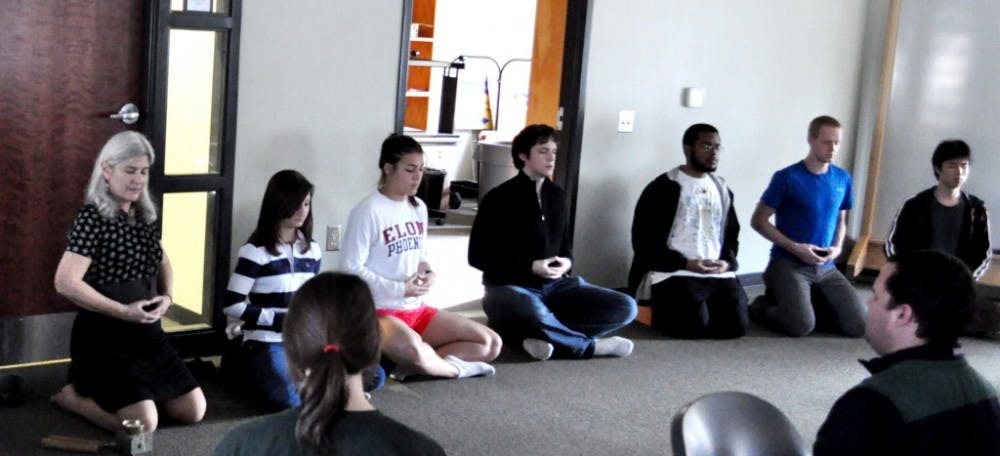When the bell chimes for the third time, the students in Belk Pavilion have quieted their minds and bodies. They are learning to use their beginner's minds. They are learning to be Zen.
Barbara Gordon, associate professor of English at Elon University, teaches Interdisciplinary Zen, a general studies class that looks at the history and practice of meditation. Not only does Gordon instruct students in the Japanese tradition, she practices it for herself.
“My meditation practice increases my appreciation of life,” Gordon said. “I notice and enjoy small moments, like the feeling of the breeze on my skin, my first sip of my tea in the morning, the rustle of leaves and the sound of raindrops.”
Not only does it emphasize the beauty of everyday life, practicing Zen provides a coping mechanism for discomfort, according to Gordon.
“The discipline of meditation sitting also builds the ability to be disciplined in other activities and withstand discomfort,” Gordon said. “At difficult moments, I can, at times, focus my attention on something simple, like my breath, to stop my mind from spinning off into fear. Even with small discomforts, like when my blood is drawn — which I greatly dislike — I can put my mind on the sounds in the room and not get so caught up in the needle going into my vein.”
Gordon has been practicing Zen at the North Carolina Zen Center in Pittsboro for more than 20 years and is a student of Sandy Gentei Stewart.
“Fortunately, too, I have had the opportunity to go on a number of weekend and week-long retreats over the years, including at the Bodhi Manda Zen Center in Jemez Springs, N.M., and Southern Dharma in Hot Springs, N.C.,” Gordon said.
Gordon said she was attracted to Zen because of the “silence and stillness, and the slowing down so that the tiny details of sensory experiences open up in a miraculous way.”
Gordon isn't the only one who practices a Zen lifestyle at Elon, either, as students have also shown interest.
“Since I started to practice Zazen, I stopped doing more than one thing at a time," senior Hiroshi Wada said. "Like when I read, I read. When I eat, I just eat. When I research for my marketing class, I just research. Simplicity and focusing on one thing at a time helped me to improve whatever I’m doing.”
According to Gordon, Zen meditation teaches students a skill that may assist them in strenuous academic life. Gordon said she believes meditation can quiet the mind so that people can get a break from ongoing “mind chatter."
“Meditation can temporarily disconnect people from rushing around and doing and connect them to simply being,” she said. “After a formal meditation sitting, the atmosphere in the room feels different. It seems people are more settled, less caught-up in the immediate pressures they were feeling and more grounded in what is timeless.”
Although Gordon is experienced at practicing Zen, she believes both she and her students benefit from learning about Eastern mysticism and its traditions. The class focuses not only on learning the history of Zen and understanding its practice, but builds connections between Zen and other disciplines, including physics and Japanese arts.
Wada said he has even started to sit several times a day, especially before doing homework or exercise.
Gordon says that this type of meditation has a deep history as well.
"Our study reveals how these seemingly disparate areas of the liberal arts, science and art, have a strong bond in the ancient practice of meditation, which may strike some as surprising at first,” Gordon said. “We study and consider the ties that experts in these disciplines have made to meditation, and critique them as well.”
Another component of the course is practicing the experiential piece of meditation. Students learn some of the ritual and background of Japanese Rinzai Zen tradition and attend a sitting at the North Carolina Zen Center.
Pursuing a Zen mindset and sharing it with students has become a large part of the way Gordon said she lives her life.
“Zen is not something one studies or pursues as a career,” she said. “It is a way one leads one’s life. Being open to what happens next with equanimity is both extraordinarily simple and extraordinarily difficult. To fully experience each moment, then let it go is the way I want to live.”


